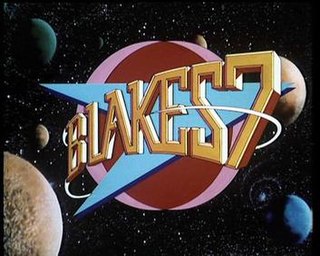
Blake's 7 is a British science fiction television programme produced by the BBC. Four series of thirteen 50-minute episodes were broadcast on BBC1 between 1978 and 1981. It was created by Terry Nation, who also wrote the first series, produced by David Maloney and Vere Lorrimer, and the script editor throughout its run was Chris Boucher, who wrote nine of its episodes. The main character for the first two series was Roj Blake, played by Gareth Thomas.

The Thirty-Nine Steps is a 1915 adventure novel by the Scottish author John Buchan, first published by William Blackwood and Sons, Edinburgh. It was serialized in All-Story Weekly issues of 5 and 12 June 1915, and in Blackwood's Magazine between July and September 1915, before being published in book form in October of that year. It is the first of five novels featuring Richard Hannay, an all-action hero with a stiff upper lip and a knack for getting himself out of tricky situations.

Terence Joseph Nation was a Welsh screenwriter and novelist. Especially known for his work in British television science fiction, he created the Daleks and Davros for Doctor Who, as well as the series Survivors and Blake's 7.
Planet of the Daleks is the fourth serial of the tenth season of the British science fiction television series Doctor Who, which was first broadcast in six weekly parts on BBC1 from 7 April to 12 May 1973. It was the first Dalek story to be written by their creator Terry Nation since 1965’s The Daleks' Master Plan.

Terrance William Dicks was an English author and television screenwriter, script editor and producer. In television, he had a long association with the BBC science-fiction series Doctor Who, working as a writer and also serving as the programme's script editor from 1968 to 1974. The Doctor Who News Page described him as "arguably the most prolific contributor to Doctor Who". He later became a script editor and producer of classic serials for the BBC.

Edward James de Souza is a British character actor and graduate of RADA, who is of Portuguese-Indian and English descent.
The Ribos Operation is the first serial of the 16th season of the British science fiction television series Doctor Who, which was first broadcast in four weekly parts on BBC1 from 2 to 23 September 1978. This serial introduces Mary Tamm as the companion Romana.
The Android Invasion is the fourth serial of the thirteenth season of the British science fiction television series Doctor Who, which was first broadcast in four weekly parts on BBC1 from 22 November to 13 December 1975.
Planet of Evil is the second serial of the 13th season of the British science fiction television series Doctor Who. It was first broadcast in four weekly parts on BBC1 from 27 September to 18 October 1975.
The Happiness Patrol is the second serial of the 25th season of the British science fiction television series Doctor Who, which was first broadcast in three weekly parts on BBC1 from 2 to 16 November 1988.

Several portions of the long-running British science-fiction television programme Doctor Who are no longer held by the BBC. Between 1967 and 1978, the BBC routinely deleted archive programmes for various practical reasons—lack of space, scarcity of materials, and a lack of rebroadcast rights. As a result, 97 of 253 episodes from the programme's first six years are currently missing, primarily from seasons 3, 4 and 5, leaving 26 serials incomplete. Many more were considered lost until recovered from various sources, mostly overseas broadcasters.
"Collision Course" is the third episode of the first series of Space: 1999. The screenplay was written by Anthony Terpiloff; the director was Ray Austin. The final shooting script is dated 13 August 1974. Live-action filming took place Tuesday 27 August 1974 through Tuesday 10 September 1974.

"War Games" is the fourth episode of the first series of Space: 1999. The screenplay was written by Christopher Penfold; the director was Charles Crichton. The final shooting script is dated 15 October 1974. Live-action filming took place Thursday 24 October 1974 through Thursday 7 November 1974.
Dudley George Simpson was an Australian composer and conductor. He was the Principal Conductor of the Royal Opera House orchestra for three years and worked as a composer on British television. He worked on the BBC science-fiction series Doctor Who, for which he composed incidental music during the 1960s and 1970s. When Simpson died aged 95 in 2017, The Guardian wrote that he was "at his most prolific as the creator of incidental music for Doctor Who in the 1960s and 1970s, contributing to 62 stories over almost 300 episodes – more than any other composer."

The Thirty Nine Steps is a British 1978 thriller film directed by Don Sharp, with screenplay by British playwright Michael Robson, based on the novel The Thirty-Nine Steps by John Buchan. It was the third film version of the 1915 novel.

Defence of the Realm is a 1986 British political thriller film directed by David Drury, starring Gabriel Byrne, Greta Scacchi, and Denholm Elliott, with Robbie Coltrane in a minor role.
"Matter of Life and Death" is the 13th episode of the first series of Space: 1999. The screenplay was written by Art Wallace and Johnny Byrne; the director was Charles Crichton. The original title was "Siren Planet". The final shooting script is dated 8 January 1974. Live-action filming took place Monday 14 January 1974 through Wednesday 30 January 1974.
"The Last Enemy" is the twenty-fourth episode of the first series of Space: 1999. The screenplay was written by Bob Kellett ; Kellett also directed. Previous titles include "The Second Sex" and "The Other Enemy". The final shooting script is dated 25 October 1974. Live-action filming took place Friday 8 November 1974 through Tuesday 19 November 1974. A three-day re-mount was scheduled from Tuesday 25 February 1975 through Thursday 28 February 1975. This re-mount concluded the filming of the first series.









